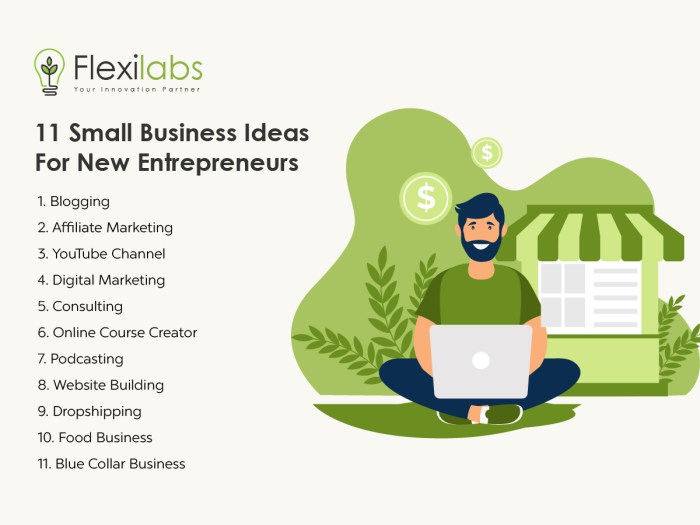Small Business Ideas take the spotlight in this cool narrative, diving into a world of creativity and opportunity. Get ready to explore a realm filled with unique concepts and groundbreaking strategies that can pave the way to success in the business arena.
From different types of business ideas to the latest trends and funding options, this guide will equip you with the knowledge needed to kickstart your entrepreneurial journey with style.
Types of Small Business Ideas
Starting a small business can be an exciting venture, but it’s important to have a clear idea of the type of business you want to start. There are various types of small business ideas that you can consider, ranging from service-based to product-based businesses. Let’s explore some of the different types of small business ideas and the differences between them.
Service-Based Business Ideas
Service-based businesses focus on providing services to customers rather than selling physical products. These businesses can range from consulting and coaching services to event planning and home cleaning services. Service-based businesses often require specialized skills or expertise in a particular area. Examples of service-based small business ideas include:
- Graphic design services
- Pet grooming services
- Personal training services
- Virtual assistant services
Product-Based Business Ideas
Product-based businesses, on the other hand, involve selling physical products to customers. These businesses can include selling handmade crafts, clothing, beauty products, or even food items. Product-based businesses require inventory management and product development skills. Examples of product-based small business ideas include:
- Handmade jewelry business
- Online clothing boutique
- Organic skincare product line
- Specialty coffee roasting business
Niche-Specific Business Ideas
Niche-specific small business ideas focus on catering to a specific market segment or addressing a unique need. These businesses can target a specific demographic, location, or interest group. Niche-specific businesses often have less competition and can attract loyal customers. Examples of niche-specific small business ideas include:
- Mobile car detailing service for luxury vehicles
- Vintage clothing store specializing in 90s fashion
- Subscription box service for eco-friendly products
- Fitness studio for pregnant women
Researching Small Business Ideas

When it comes to starting a small business, doing your homework is key. Researching and validating small business ideas can make or break your venture. Let’s dive into some methods to help you kick-start your journey into entrepreneurship.
Importance of Market Analysis
Market analysis is crucial in selecting a viable business idea because it helps you understand the demand for your product or service. Here are some steps to follow when conducting market analysis:
- Identify your target market and understand their needs and preferences.
- Research your competitors to see what they are offering and how you can differentiate your business.
- Analyze industry trends and economic conditions that may impact your business.
Identifying Target Customers
To identify your target customers for your small business idea, consider the following:
- Define your ideal customer profile based on demographics, interests, and behaviors.
- Conduct surveys or interviews to gather feedback and insights from potential customers.
- Utilize social media and online analytics to track and analyze consumer behavior.
Trends in Small Business Ideas
In the ever-evolving world of small business, staying up-to-date with current trends is crucial for success. Let’s explore some of the latest trends shaping small business ideas today.
Impact of Technology Advancements
Technology advancements have revolutionized the way small businesses operate, opening up new opportunities for entrepreneurs. From e-commerce platforms to AI-driven marketing strategies, technology has paved the way for innovative business ideas that were once unimaginable.
- Subscription Box Services: With the rise of online shopping, subscription box services have become increasingly popular. From beauty products to gourmet foods, these curated boxes offer convenience and personalized experiences for customers.
- Virtual Event Planning: The shift towards virtual events due to the pandemic has created a demand for virtual event planning services. Entrepreneurs who can adapt to the digital landscape and offer unique virtual event experiences are in high demand.
- Remote Work Tools: As more businesses transition to remote work setups, the demand for remote work tools and software solutions has skyrocketed. From project management platforms to communication tools, there is a growing market for products that facilitate remote collaboration.
Examples of Innovative Small Business Ideas
Innovation is the key to standing out in a competitive market. Here are some examples of small business ideas that have emerged recently, showcasing creativity and adaptability:
- Plant-Based Food Products: With the increasing focus on sustainability and health, plant-based food products have gained popularity. From plant-based meat alternatives to dairy-free desserts, entrepreneurs are tapping into the growing demand for eco-friendly food options.
- Personalized Wellness Services: The wellness industry continues to thrive, with a focus on personalized and holistic approaches to health. Small businesses offering personalized wellness services such as customized fitness plans, mental health coaching, and wellness retreats are meeting the needs of health-conscious consumers.
- Sustainable Fashion Brands: Consumers are becoming more environmentally conscious, driving the demand for sustainable fashion brands. Small businesses that prioritize ethical sourcing, eco-friendly materials, and transparent production processes are gaining traction in the fashion industry.
Funding Small Business Ideas

Starting a small business requires financial backing, and there are various sources of funding available to entrepreneurs. Let’s explore the different options for funding small business ideas and the pros and cons of bootstrapping versus seeking external funding.
Sources of Funding for Small Business Ideas
- Personal Savings: Using your own money to fund your business idea gives you full control but can be risky.
- Friends and Family: Borrowing money from loved ones can be a quick way to get funding, but it may strain relationships if not repaid.
- Bank Loans: Traditional bank loans provide a lump sum of money but come with strict requirements and interest rates.
- Angel Investors: Angel investors offer capital in exchange for ownership equity or convertible debt in your business.
- Venture Capitalists: Venture capitalists invest large sums of money in exchange for equity and involvement in decision-making.
- Crowdfunding: Platforms like Kickstarter allow you to raise funds from a large number of people in exchange for rewards or equity.
Bootstrapping vs. Seeking External Funding
- Bootstrapping: Bootstrapping involves using personal savings or revenue generated by the business to fund operations. It gives you full control over your business but may limit growth potential.
- Seeking External Funding: External funding can provide the capital needed to scale your business quickly but often comes with giving up ownership and decision-making control.
Creating a Budget and Financial Plan, Small Business Ideas
- Start by estimating your startup costs, including equipment, marketing, and operating expenses.
- Develop a detailed sales forecast to project revenue and expenses over the short and long term.
- Track your finances regularly and adjust your budget as needed to stay on track.
- Consider hiring a financial advisor to help you create a solid financial plan for your small business idea.